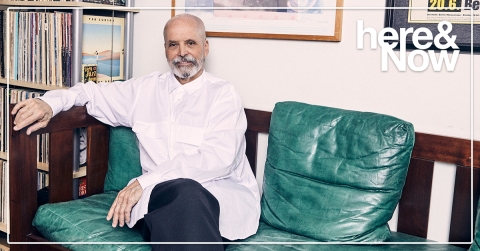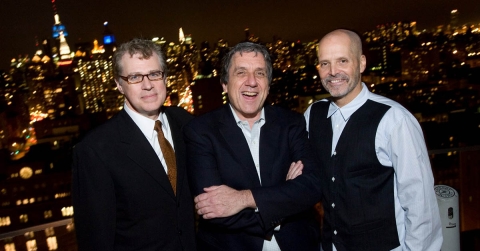On Tuesday, June 11, Nonesuch Records Senior Vice President David Bither was honored at the annual Bang on a Can Benefit and presented with the organization’s 2013 Visionary Award. The special event included an intimate concert featuring Bang on a Can’s Asphalt Orchestra, violinist Todd Reynolds, Bang on a Can All-Star David Cossin with Wilco's Glenn Kotche, Devendra Banhart, and Carolina Chocolate Drops. The evening brought moving tributes from Nonesuch President Bob Hurwitz and Bither’s brother Philip. Here are the remarks David Bither gave in accepting the award.
On Tuesday, June 11, Nonesuch Records Senior Vice President David Bither was honored at the annual Bang on a Can Benefit and presented with the organization’s 2013 Visionary Award. The special event took place at City Winery in New York City and included an intimate concert featuring Bang on a Can’s Asphalt Orchestra, violinist Todd Reynolds performing Michael Gordon’s Light is Calling, Bang on a Can All-Star David Cossin with Wilco's Glenn Kotche performing works by Kotche and by Steve Reich; Devendra Banhart; and Carolina Chocolate Drops. The evening brought moving tributes from Nonesuch President Bob Hurwitz and Bither’s brother Philip, the Senior Curator of Performing Arts at Walker Art Center in Minneapolis, followed by the presentation of the Visionary Award by Bang on a Can co-founders Michael Gordon, David Lang, and Julie Wolfe.
Below are the remarks David Bither gave in accepting the award:
When my friend [Bang on a Can Board Member] Michael Kushner stopped by my office a few months ago, he sat down, looked at me expectantly and said, “You know, of course, why I am here.”
Now, Michael—who works just a few floors above me at Atlantic Records—rarely stops to visit, so I assumed there was some unusual purpose to his call. But in all honesty, I had no idea why he was there, and I told him so.
He looked surprised and told me that of course he had come by to tell me that Bang on a Can wanted to honor me at this year’s benefit.
Had he given me an hour—or maybe a week—to guess why he had stopped by, I don’t think I would have come up with the purpose of his visit.
I was honored and flattered of course, but I spent the next week thinking about why Michael [Gordon] and Julie [Wolfe] and David [Lang], and Kenny [Savelson, Executive Director] and Tim [Thomas, Development Director] and the Bang family, believed this idea of honoring me had any merit.
Yes, we have been fellow travelers … when I first arrived in New York in the late 1970s, ravenous to see and hear what I’d been reading about growing up in the suburbs of Chicago, one of my pursuits was writing about the music I found most interesting in the city … which led me to a host of clubs that no longer exist but also to a small apartment off Tompkins Square Park to watch John Zorn perform his Theatre of Musical Optics for an audience of four; to the Kitchen in Soho to view Robert Ashley’s video opera Perfect Lives on monitors scattered through the room; to the Bottom Line to hear Steve Reich’s musicians perform his astounding Music for 18 Musicians; to Town Hall to hear Philip Glass’s ensemble play his seminal Music in Twelve Parts; to BAM to witness Laurie Anderson’s heroic United States; to Broadway, of all places, to experience the collaboration of Twyla Tharp and David Byrne on The Catherine Wheel; and finally to a loft on Sixth Avenue to interview John Cage on the occasion of his 70th birthday—I will never forget the way he laughed, he opened his mouth wide and his head shook but no sound came out … how like John Cage, I thought. These are artists who changed our music—and dance—in ways that we are still working through almost 40 years later.
And then in 1983, while toiling in my day job at Warner Communications, I had what turned out to be a life-changing meeting with the head of ECM Records in North America, soon to become President of Nonesuch Records, Bob Hurwitz. About Bob, more in a minute, but one of the first signings Bob made when he started the new Nonesuch was the Kronos Quartet, a renegade band of string players who had made a record I’d heard interpreting Thelonious Monk’s music but who would go on to produce a staggering body of new music. In the realm of the string quartet, in the realm of classical music, Kronos was a revolution, from the way they dressed, to the manner in which they were organized, to the music they commissioned and performed.
And then in the late 1980s I heard about a new band of musicians and composers with the improbable name of Bang on a Can. They seemed to have absorbed lessons from all of the artists I’ve talked about, from Reich and Anderson and Cage and Kronos. At first it was just a name to me, but then they began to make records and organize marathons … I missed the first one, at Exit Art in 1987, but I note that Steve Reich and John Cage took part.
As the years went by and I moved in to Elektra Records and then out in 1994 to its precocious offspring Nonesuch, the work that Michael and Julie and David were making not only became part of the musical nourishment for many of us but also became its own kind of model for a creative community that could encompass composition, performance, recording, education, concert production and advocacy. I got to know all of them but particularly Michael, with whom I was proud to work on his Weather and Light is Calling recordings. We were roughly the same age; we’d grown up listening to the Beatles and the Beach Boys and the Velvet Underground and later Ellington, Copland, Coltrane, Ives. We both became teenagers in the late '60s, a time when the world seemed to be changing in every way and music was integral to the revolutions taking place. Music’s power seemed limitless and crucial to us … and continued to do so as the 20th century turned into the 21st.
I digress at such length because I think this is the ground from which Bang on a Can and Nonesuch both grew. And it is in that spirit that I felt I could accept this honor—in tribute to Michael, Julie, David and all the musicians who have been part of the Bang on a Can universe and on behalf of the artists and staff of Nonesuch Records, fellow travelers in a musical universe that recognizes few boundaries beyond trying to work with some of the most creative musicians of our time.
I don’t know that I will ever have the experience of being so honored again, so for just one more minute, I have to thank a few people. So many friends are here tonight and I am grateful to you all for the honor you pay me in being here.
The privilege of working with Bob Hurwitz at Nonesuch—who has been a mentor, an inspiration, a trailblazer and a friend—has meant so much to my professional career. He has created a company that is unique and whose imprint, I believe, will be long lasting. Nonesuch would not, however, have lasted long without Peter Clancy, who started at Nonesuch the first day of Bob’s tenure and has been at his side ever since. To Peter and Karina Beznicki, Melissa Cusick, Gregg Schaufeld, Matthew Rankin, Artie Moorhead, Stephanie Bauman, Katie Havelock, Andrew Wright, Robert Edridge-Waks—this honor is yours as much as mine.
To my families—the Baileys and Allegaerts and Filosas, to my sister Kathy, my brother Philip, my late brother Steven and my parents—my mother came all the way from Northern Wisconsin to be here—we have lived a life together and I have been, to misquote Lou Gehrig, the luckiest man alive to have shared it with you.
And especially to my beloved Elizabeth and Sam … It would all be empty without you.
And, finally, to the artists I have had the extraordinary privilege of working with over the past quarter-century …
Thinking about tonight’s event, my wife Elizabeth wrote me the other day and I was so moved that I decided to simply quote her:
What does it mean to make serious music on any level these days? And by extension how difficult is it when all media drives one to more conventional, moneyed, innocuous, superficial pursuits? Living outside the box—and with discomfort—is the life of the artist and we must acknowledge that we need this from them, so that they can speak to our yearnings, sufferings, fleeting happiness. By asking them to continually express to us our experience of what it is to be human we ask so much of them and sometimes we give so little in return - particularly in this day where all is Spotified. In an age that worships fast money, big cars, lots of servants and no empathy—the artist speaks to what it means to live, love, suffer. Certainly music is the most accessible, universal and timeless expression of this and why we go to it to mark births, marriages, engagements, milestones, deaths. There is music—written by artists either obscure or celebrated—that soothes or challenges or celebrates life's every fleeting and varied moment.
It has been an extraordinary honor to play a small role in helping give some of those musicians and that music a home.
—David Bither, June 11, 2013
- Log in to post comments



